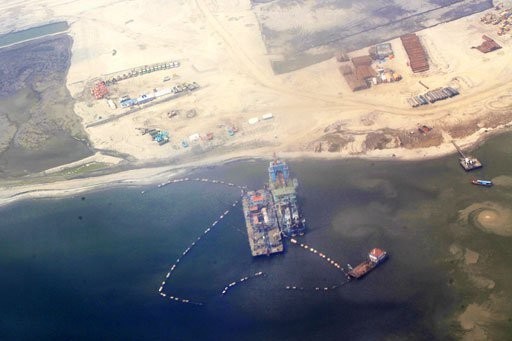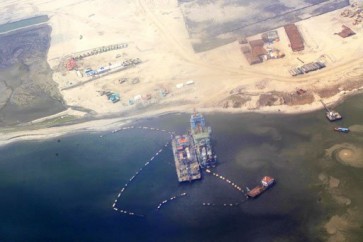Popular Reads
Top Results
Can't find what you're looking for?
View all search resultsPopular Reads
Top Results
Can't find what you're looking for?
View all search resultsJakarta sinks at slower pace, but more areas affected
A team of researchers from the Bandung Institute of Technology (ITB) studied data from 1925 to 2015 and concluded that significant land subsidence had affected the capital city since 1975.
Change text size
Gift Premium Articles
to Anyone
F
or 25 years, Sari, a 35-year-old woman living in a kampung (small hamlet) in Muara Baru, North Jakarta, has had to put up with flooding from heavy rainfall and the rising tides of Jakarta Bay. A four-meter-high seawall erected along the water’s edge does not always protect the area, which is located less than 300 meters from the sea.
“Tidal flooding is an almost daily threat for us, especially during the rainy season. Just last month, our community unit [RW] was flooded about 20 centimeters after heavy rainfall. I really want to move to another, better, place, but I just can’t afford it,” Sari told The Jakarta Post on Friday.
Her neighborhood, along with the rest of North Jakarta, is under constant threat from rising sea levels and rapid land subsidence. A team of researchers from the Bandung Institute of Technology (ITB) studied data from 1925 to 2015 and concluded that significant land subsidence had affected the capital city since 1975. The team predicted that Sari's house, along with 90 percent of North Jakarta, will be submerged by 2050.
The study also found that North Jakarta was the worst affected area. Marunda and Cilincing had sunk 1.5 m, Kelapa Gading had sunk 2.4 m and Pluit had sunk 4 m as of 2015. Jakarta is still sinking about 1 to 15 cm per year, making it one of the fastest-sinking cities in the world.
Recent developments in the study, however, have shown that the rate of land subsidence in Muara Baru and several other areas in North Jakarta has slowed.
"The land subsidence rate in Muara Baru had decreased about fifty percent, from about 20 to 26 cm per year to 10 to 12 cm a year. Even though the area is still sinking at a rapid pace, but the data carries good news. It means that we have hope for slowing down the subsidence or even to stopping it,” Heri Andreas, an expert from the ITB team told the Post.
Heri said that besides Muara Baru, several other areas in the capital city had also experienced a slower rate of land subsidence. The data showed that the pace of land subsidence in Pluit and Mutiara Beach in North Jakarta had decreased about 50 percent from 20 cm a year to 10 to 12 cm a year. Cengkareng and Daan Mogot in West Jakarta showed about a 66 percent decrease from 15 cm a year to 5 cm a year.


















